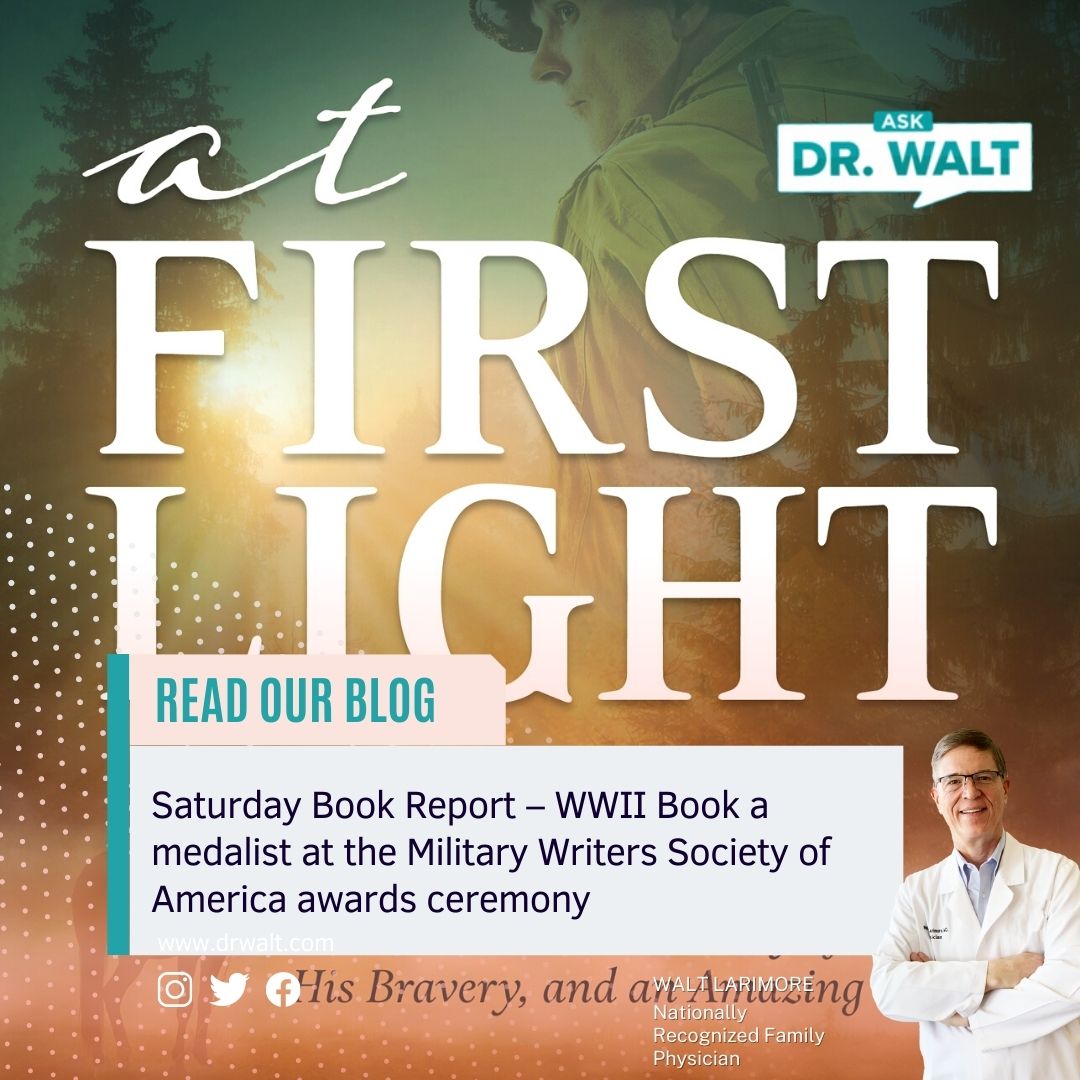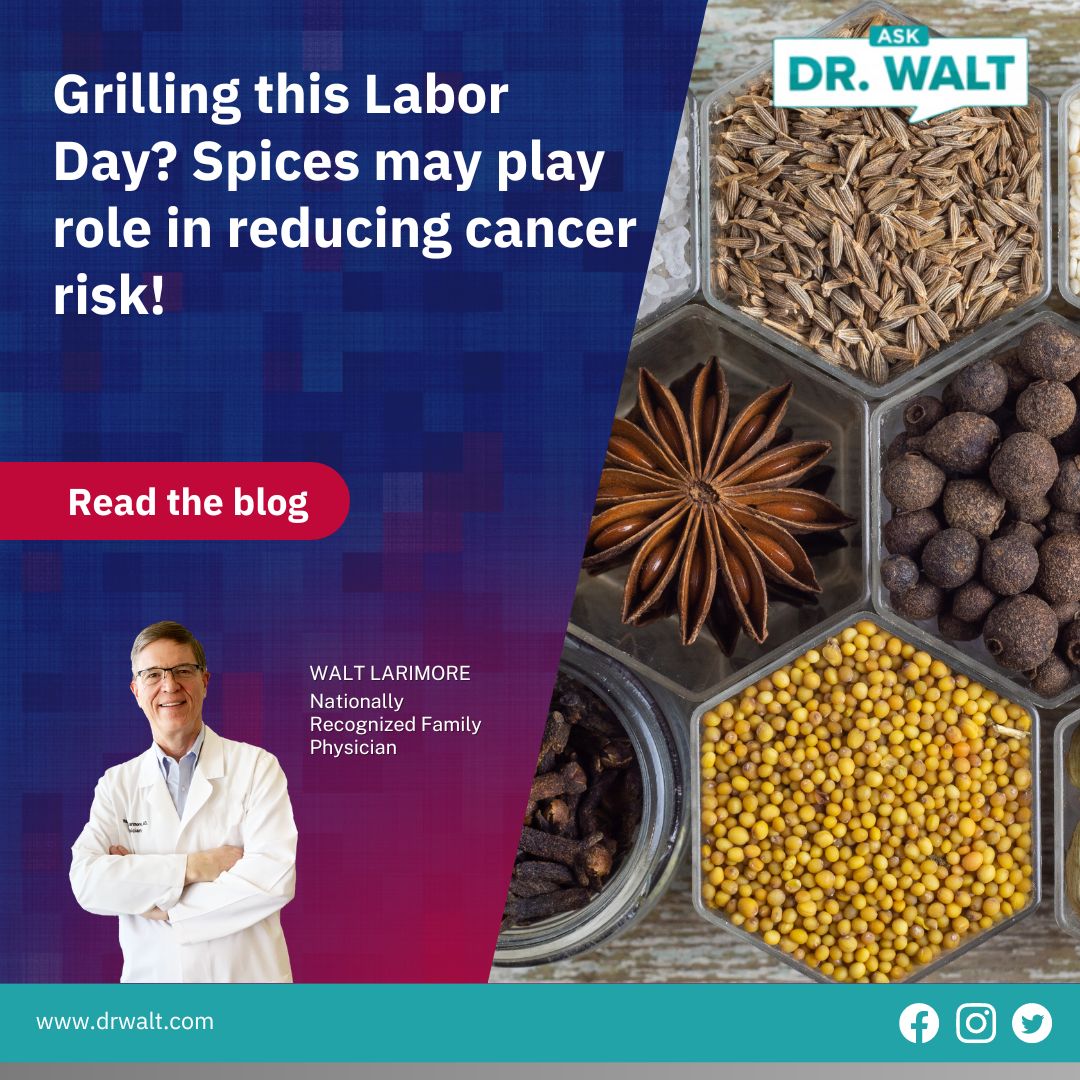
Saturday Book Report – WWII Book a Silver Medalist at the Military Writers Society of America awards ceremony
September 3, 2022
Grilling this Labor Day? Spices may play role in reducing cancer risk!
September 5, 2022This Sunday message is excerpted from an article I wrote entitled, “Unique Opportunities to Share the Gospel” that was written to encourage healthcare professionals to bring their spiritual faith to work.
Between the moment of our salvation and the moment we graduate to glory, Christians interact with people from two worlds: unbelievers (2 Cor 6:4) and believers in Jesus (John 3:18) or Christians (Acts 11:26). The Bible teaches that our activities with believers include fellowship and worship, while all of our activities with unbelievers fall under lifestyle evangelism.
Jesus is Sending Us
Jesus said, “As the Father has sent Me, I am sending you” (John 20:21) … to “seek and save the lost” (Luke 19:10). His followers are all to be “the salt of the earth … the light of the world,” and He commanded us to “let your light shine before others, that they may see your good deeds and glorify your Father in heaven” (Matt 5:13-16).
I define “being light” as “living the Good News” and “being salt” as “speaking the Good News” or “the Gospel.” Furthermore, I believe “being light” involves:
- competence or doing excellent work (Col 3:23),
- character or demonstrating integrity (Phil 2:14-15), and
- compassion or displaying kindness (Phil 2:4).
Evangelism is most fruitful when it is face-to-face – in person. The “light” is most intense when we are closest to it.
Biblical evangelism is not televangelism (“tele” is a root word that comes from the Greek word that means ”far off” or ”at a distance”).
We can’t share the Good News without being present. Caring for unbelievers from afar is for us not an option.
Our Ministry in Healthcare Must be Founded on Prayer
Christian healthcare professionals must understand, “We are God’s handiwork, created in Christ Jesus to do good works, which God prepared in advance for us to do” (Eph 2:10).
As we serve our patients, Paul tells us, “Do not be anxious about anything, but in every situation, by prayer and petition, with thanksgiving, present your requests to God” (Phil 4:6).
Being salt and light must be practiced on, proceeded by, and protected with the power of prayer.
Jacob Boehme wrote:
To pray aright is right earnest work. … It is in one aspect glory and blessedness; in another, it is toil and travail, battle and agony. Uplifted hands grow tremulous long before the field is won.
As author S. D. Gordon advised:
You can do more than pray after you have prayed. But you cannot do more than pray until you have prayed.
While Samuel Chadwick, a Wesleyan Methodist minister, added:
Satan dreads nothing but prayer. His one concern is to keep the saints from praying. He fears nothing from prayerless studies, prayerless work, and prayerless religion. He laughs at our toil, he mocks our wisdom, but he trembles when we pray.
We Must Minister with Words and Works
Upon a mighty foundation of prayer, Jesus sends us out, as He did His disciples, “to proclaim the kingdom of God and to heal the sick” (Luke 9:2 and Matt 4:23). We are to minister in patient care with words and actions.
Some Christian health professionals want to “heal the sick” but not “proclaim the kingdom.” They often tell me, “St. Francis of Assisi said, ‘Preach the Gospel at all times, and if necessary, use words.’” But there are three problems with this:
- Francis never said it. In fact, he wrote the opposite: “All the Friars, however, should preach by their deeds.”
- No one is good enough to actually do this. Elton Trueblood noted, “The living deed is never adequate without the support which the spoken word can provide. This is because no life is ever good enough. The person who says naïvely, ‘I don’t need to preach; I just let my life speak,’ is insufferably self-righteous. What one among us is so good that he can let his life speak and leave it at that?”
- Finally, it’s terrible theology. In a Washington Post article titled, “Call yourself a Christian? Start talking about Jesus Christ,” Ed Stetzer points out, “You see, using [St. Francis’] statement is a bit like saying, ‘Feed the hungry at all times; if necessary, use food. For Christians, the Gospel is Good News — it’s what the word literally means. The Good News needs to be told.” Trueblood adds, “We must use words because our faith must be in something vastly greater than ourselves. We make a witness by telling not who we are but whose we are.” Samuel Shoemaker added, “I cannot by being good tell of Jesus’ atoning death and resurrection, nor or my faith in His divinity.”
So, how do we Christian healthcare professionals verbally share the Good News? How do we be salt that is flavorful? Let me suggest two of the many “spiritual interventions” that Dr. Bill Peel and I share in CMDA’s “Grace Prescriptions” course:
A Spiritual Assessment
First, we cannot provide proper treatment without a proper history.
Adding a short “spiritual assessment” to your social history with each patient you see is a powerful way to see where are patients are on their spiritual journey. Are they a believer or an unbeliever? To the former, we can offer spiritual support, and to the latter spiritual salvation.
If you’ve never utilized a spiritual assessment, I have written a review article explaining the academic and Biblical support for this evidence-based form of quality patient care as well as some “tips” on how to do this quickly and efficiently.
We are all bombarded with patients needing rapid assessment and care, so I pray you’ll find this quick and simple spiritual history easy to use.One of the easiest to remember and use is what I call “The God Questions“:
- G = God: May I ask about your faith background? Do you have a spiritual or faith preference? Is God, spirituality, religion, or prayer important to you, or not?
- O = Others: Do you now or have you ever met with others in religious or spiritual community? If so, how often? How important or supportive is/was this to you?
- D = Do: What can I do to help you incorporate your faith into your medical care? Do you need to see a chaplain, pastor, or priest? Do you need any religious materials or resources? May I pray with/for you? May I have others pray?
Of course, you can adapt these questions to fit your personality, specialty, organization, and situation. For those already comfortable utilizing a simple spiritual assessment, you may want to consider my review on a more advanced assessment, the LORD’s LAP, that can quickly and easily help you discover if your religious patients are experiencing any “religious/spiritual distress.”
Praying With Patients
Second, not only must we pray for our patients, our colleagues, and ourselves, but also, we now have a wonderful opportunity in healthcare to pray with our patients. Scripture clearly teaches us, “Let us then approach the throne of grace with confidence, so that we may receive mercy and find grace to help us in our time of need,” (Heb 4:16) and, “The prayer of a righteous person is powerful and effective,” (Ja 5:16).
As we close our time with our patients, instead of just wishing them “good luck” or “goodbye,” we can say something like, “I know this is a lot to be going through or to think about. Would you mind if I prayed for you about this?”
Patients who say “yes” to prayer often assume that the praying will be done later. When they say “yes”, I say, “May I pray with you right now?”
A prayer spoken out loud directly to God on behalf of my patient is a simple way to help them experience the reality of being in the presence of God. I keep it short and simple.
I don’t address God as if He doesn’t know what’s going on. It may be something like, “Dear Lord, you know my patient is sick, worried, and scared. I invite you into our trouble. I ask you to help us trust you as you work out your plan for this precious person’s life. Amen.”
Larry Dossey, MD, writes, “Not to employ prayer with my patients was the equivalent of deliberately withholding a potent drug or surgical procedure.”
If you choose to offer to pray with patients, the Christian Medical and Dental Associations recommends considering the following prerequisites:
- You should have taken a spiritual history.
- The patient must either request or consent to prayer.
- The situation calls for prayer.
Discuss with the patient any specific prayer requests and specific people you can share the prayer request with (i.e., colleagues, your spouse, prayer ministers at your church, etc.). Finally, it is critical for you to record the patient’s request or consent for prayer in the medical record and, of course, at all times, remember confidentiality.
As Christian healthcare professionals, we have a powerful healing resource that not all healthcare professionals know how to use—prayer. Use it! Intentionally, wisely, and prayerfully.
And, for a patient who desires prayer, a Christian healthcare professional’s prayer may be as or more therapeutic than any other intervention we can offer.
For more details about praying with patients, I’ve written an article “Praying with Our Patients.” I also did an international webinar for praying for patients in clinical care for the International Christian Medical and Dental Associations.
Conclusion
A mentor and dear friend of mine, Sir Paul Brand, MD, once wrote to me:
In the medical profession, we do have a matchless, wonderful opportunity to meet people at times of their real need when they are ready to open up their hearts and expose their fears and worries and concerns.
This has never been truer than today. I’m finding an incredible openness in my patients who are both the “walking worried” and the “sick and worried.” By cracking open the door to spirituality and to Jesus, most are open to my throwing it wide open.
Let me conclude by borrowing from Luther:
I hope that I’ve written enough in this [article] for those who can be saved so that — God be praised — many may thereby be snatched from [Satan’s] jaws and many more may be strengthened and confirmed in the truth. May Christ our Lord and Savior preserve us all in pure faith and fervent love, unspotted and pure until his day. Amen. Pray for me, a poor sinner.
Biographical information: Walt Larimore, MD, is one of the best-known Christian family physicians in America and a prolific author of over 1100 articles in a wide variety of professional and lay publications, over 30 medical textbook chapters, and 35 best-selling books – the most recent of which is Fit over 50: Make Simple Choices Today for a Healthier, Happier You. He has been named a 2019 Lifetime Achievement Award recipient of Marquis’ Who’s Who in America, and has been listed in Distinguished Physicians of America, The Best Doctors in America, Who’s Who in Medicine and Healthcare, the Guide to America’s Top Family Doctors, and America’s Registry of Outstanding Professionals. He has been named America’s Outstanding Family Physician Educator (Thomas W. Johnson Award) by the American Academy of Family Physicians and he and his wife, Barb, have been named National Educators of the Year by the Christian Medical and Dental Associations.
© Copyright WLL, INC. 2022.




